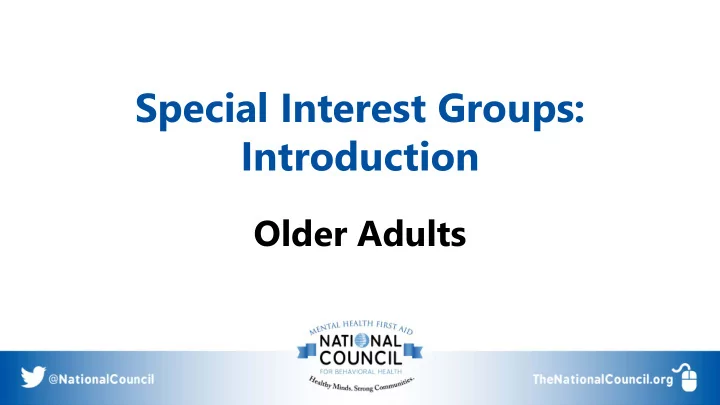

Special Interest Groups: Introduction Older Adults
Introductions Nicole Cadovius Director, Practice Improvement National Council for Behavioral Health Washington, D.C.
Agenda for Today’s Meeting 1. Introductions 2. Purpose of the Group 3. We Want to Hear from You 4. Brainstorming Discussion Topics 5. Content Expectations & Engagement 6. In-Person Meeting at NatCon20 7. Proposed Meeting Schedule
Quick Facts on Older Adults By 2030, the United States for the first time will have more 65+ residents than children. • One fourth of older adults experiences some mental disorder including depression and anxiety disorder and • dementia. This number is expected to double to 15 million by 2030. 5% of older adults in the community meet diagnostic criteria for major depression and 15% have clinical significant • depressive symptoms Number of older adults with substance abuse problems expected to double to 5 million by 2020. • Untreated substance abuse and mental health problems among older adults are associated with poor health • outcomes, higher health care utilization, increased complexity of the course and prognosis of many illnesses, increased disability and impairment, compromised quality of life, increased caregiver stress, increased mortality, and higher risk of suicide. In 2014, nearly 11,0000 people 60+ died by suicide. People aged 85+ have the highest suicide rate of any age group. • Older white men have a rate almost six times the regular population. Behavioral health problems are not a normal part of aging and can be treated. 66% of older adults are not receiving • the care they need. Current preventative services for this population are limited. Taken from: https://www.ncoa.org/news/resources-for-reporters/get-the-facts/healthy-aging-facts/ https://www.ncoa.org/resources/issue-brief-6-depression-and-anxiety-screening-and-intervention/
About the National Council for Behavioral Health We are the unifying voice of America’s health care organizations that deliver mental health and addictions treatment and services. Together with our 3,326 members, we are fighting to ensure all Americans have access to comprehensive, high- quality care that affords every opportunity for recovery. Join us for our annual conference! Visit www.thenationalcouncil.org to learn more! Visit www.NatCon20.org for details.
Purpose of the Group We’re launching our Special Interest Groups initiative with you in mind. Our goal is to give you the tools, knowledge and networks you need to accelerate your understanding of, and impact in, your area of interest. What can you expect? Throughout 2020, we will share resources, publish content and hold conversations around all- things Older Adults within the behavioral health care space. This is your chance to stay atop of political and social issues, address emerging trends, receive new learning, connect with likeminded peers and move the conversation forward.
We Want to Hear from You We are conducting this webinar to better understand your needs and expectations around this area of interest. To help us support your learning journey in 2020, we want to know: • What about this group interests you? • What are you hoping to get out of this group? • What do you want to learn more about within this group? • What type of knowledge or resources will benefit you in your role? As interested members, you will help drive and define this group through your participation. By sharing your feedback, you will help us deliver the best possible learning experience.
Brainstorming Discussion Topics Throughout 2020, we will highlight various topics and issues within the “Older Adults” group. Examples include: • Assessment of Dementia for people with Serious Mental Illness • Substance use in later life, the impact of opioids and other substances • Innovative care models of geriatric mental health in community settings • Suicide and bullying in older adults To help us define our year-long agenda, we want to know: • What would you like to see covered next year? • What topics within this group interest you the most? • What are your learning goals for the year?
Content Expectations & Engagement We are committed to helping you learn and grow. To keep you informed, we will deliver the following throughout the year: • Regularly published content (e.g., blog posts) • Webinars offering insights into your group • Calls to help further the conversation • A special NatCon20 networking opportunity • A platform for sharing your ideas and input We want to know : What else can we do to support your learning experience?
In-Person Meeting at NatCon20 There will be multiple touchpoints throughout the year to discuss and explore topics within this group. Of note is a special networking and learning session at NatCon20 in Austin, Texas, to be held April 5-7. This is your chance to connect with colleagues, build your network and lead the conversation around this interest area. Learn more by visiting www.natcon20.org What would you like to experience during this on-site event? How can we make this meeting impactful for you?
Proposed Meeting Schedule (Bi-Monthly) To keep the conversation going, we will conduct bi-monthly chats starting in February. Meeting Month Group Activity At left is a tentative schedule outlining our February 2020 Meeting with Community conversations around this area of interest. April 2020 Meet and Greet at NatCon2020 June 2020 Meeting with Community • Is this level of engagement helpful? August 2020 Meeting with Community • Have any agenda ideas? October 2020 Meeting with Community December 2020 Meeting with Community Within this group, we will explore behavioral health care and move the field forward.
Nicole Cadovius NicoleC@thenationalcouncil.org Director, Practice Improvement National Council for Behavioral Health Washington, D.C. This Photo by Unknown Author is licensed under CC BY
Recommend
More recommend